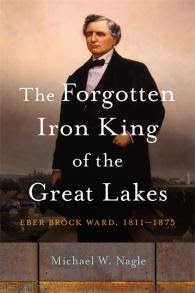 Justus S. Stearns: Michigan Pine King and Kentucky Coal Baron, 1845–1933 (2015), which won the Kentucky History Award.
Justus S. Stearns: Michigan Pine King and Kentucky Coal Baron, 1845–1933 (2015), which won the Kentucky History Award.
Nagle applied the “Page 99 Test” to his new book, The Forgotten Iron King of the Great Lakes: Eber Brock Ward, 1811-1875, and reported the following:
A reader turning to page 99 of this biography of Eber Brock Ward, would find the first page of chapter four, which is entitled “A Man of Iron and Steel.” The Page 99 Test seems to work well for my book because Eber Ward eventually became a major producer of iron and steel in the United States. Page 99 provides a transition from the first part of the book, which focuses on Ward’s early life and his early career in business, to the book’s second half where Ward established the Eureka Iron Company outside of Detroit, and then took steps to expand his business empire.Follow Michael W. Nagle on Facebook.
Although Eber Ward was born into a modest family, when he died in 1875, he was the richest man in Michigan. He started his career as a cabin boy working for his uncle, Samuel Ward. Eventually, he became his uncle’s protégé and ultimately his partner. Together, the Wards developed one of the largest fleets of steamboats on the Great Lakes. Eber eventually expanded his business empire to include railroads, lumber, mining, glassmaking and iron and steel production. He was the first in the United States to produce steel using the more modern Bessemer method. His operations were so expansive, in 1873 the Chicago Tribune labeled him the “Iron King of the West.”
While Ward was successful in business, his actions were often controversial. He ran his companies with an iron fist and ruthlessly dealt with anyone who dared to compete with his operations. He fought against unions and attempted to control aspects of his employees’ private lives. Ward’s family life was disappointing. He was an absent parent and unfaithful husband. Yet, he was an ardent opponent of slavery and his vessels often carried runaway slaves to freedom on the underground railroad. Ward strongly supported the Union during the Civil War and defended the rights of former slaves in the years following the war.
The book also addresses Ward’s interest in spiritualism, the battle over his estate valued at $5.3 million, and the exploits of his daughter, Clara, who gained international headlines of her own when she married a Belgian Prince. However, her marriage ended in divorce and scandal after she left her prince for a Hungarian violinist.
Many are unfamiliar with Ward’s accomplishments, but he was a true titan of industry whose business practices predated those of other business moguls, such as Andrew Carnegie and Henry Ford.
--Marshal Zeringue



